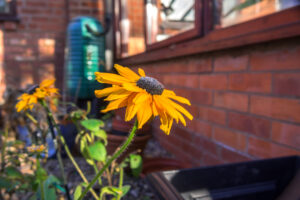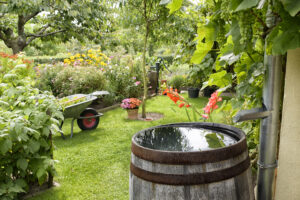RECYCLING RAIN
Recycling Rain - Conservation at Home
 During a typical rainstorm, the rain that falls on the roof runs off into the ground, a storm drain, or a stream. If you're motivated to save a little water to redistribute on your lawn or plants, collecting rainwater from your gutters' downspouts is a no-brainer.
During a typical rainstorm, the rain that falls on the roof runs off into the ground, a storm drain, or a stream. If you're motivated to save a little water to redistribute on your lawn or plants, collecting rainwater from your gutters' downspouts is a no-brainer.
You can even use landscaping features to filter the pollutants out of stormwater runoff that would otherwise have be detrimental to our watershed.
What Can You Do?
Learn about rainwater harvesting, rain barrels and rain gardens and recycle your water!
Rain Gardens
Are you thinking about implementing a rain garden in your space? If so, check out this fantastic video series from Clemson Extension.
Since 2012, Greenville County’s population has increased an average of 1.9% a year. As development needs are met there is an increase in the amount of impervious surfaces such as roadways, rooftops, parking lots and sidewalks. These types of surfaces do not allow for water to be absorbed. Water that runs over these surfaces can pick up various types of pollutants on the way. Without a filter, these pollutants end up in our area waterways and rivers. Bacteria from pet waste, nutrients from yard waste, litter, sediment, pesticides and herbicides and metals can all end up in our local rivers and streams. Water that runs over theses surfaces is called stormwater. Stormwater is essentially precipitation that falls from the sky as well as snowmelt.
Stormwater can flush the landscape and lead to increased flooding, erosion, sedimentation and damage to wetlands, ecosystems and waterways.
Rain gardens are a popular way to offset a community’s impact on its waterways. Rain gardens are landscaped depressions that capture and naturally “treat” the stormwater. They allow for the runoff to slowly infiltrate to the groundwater table. Rain gardens also work as a filter to remove some of the pollutants that would have otherwise affected water quality.

Native plants are recommended for rain gardens because of their natural ability to adapt to the conditions of the area. They often require less fertilizer and watering then that of nonnative plants.
Greenville County Soil and Water Conservation District has two rain garden specialists on staff. EMAIL for more information or call us at 467-2755.

